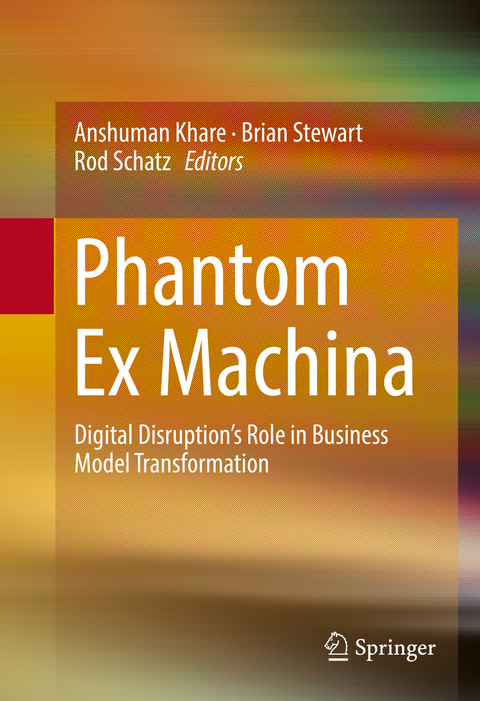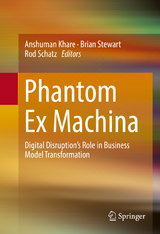Phantom Ex Machina
Springer International Publishing (Verlag)
978-3-319-44467-3 (ISBN)
This book explores the factors that make digital disruption possible and the effects this has on existing business models. It takes a look at the industries that are most susceptible to disruption and highlights what executives can do to take advantage of disruption to re-invent their business model. It also examines the pivotal role that technology plays in creating new dynamics to business operations and forcing business model changes. Adoption of digital technology has caused process disruptions in a number of industries and led to new business models (e.g., Über, AirBnb) and new products. In addition to covering some of the more popular and well known examples, this book targets not so obvious disruptions in the education sector and in services and changing business models.
Phantom Ex Machina: Digital Disruption's Role in Business Model Transformation is divided into six parts. The book begins with an introduction to digital disruption and why it matters. The nextpart of the book focuses on business strategy which includes case studies on the impact of social media and how digital disruption changes pricing strategies and price models. For part three, the authors observe technology's role in digital disruptions. Chapters cover how 3D printing is challenging existing business models and how the automotive industry is innovating with new perspectives. Part four covers higher education, recognizing digital disruption's transformation in graduate management education. Part five centers upon the service industry with a look at virtual teams and the emergence of virtual think tanks. Finally the book concludes with a look to the future, embracing disruptions.
Anshuman Khare is Professor in Operations Management at Athabasca University, Canada. He joined Athabasca University in January 2000. He is a MBA and PhD from Allahabad University, India. He is an Alexander von Humboldt Fellow and has completed two post-doctoral terms at Johannes Gutenberg Universität in Mainz, Germany. He is also a former Monbusho Scholar, having completed a postdoctoral assignment at Ryukoku University in Kyoto, Japan. He has published a number of books and research papers on a wide range of topics. His research focuses on environmental regulation impacts on industry, just-in-time manufacturing, supply chain management, sustainability, cities and climate change, etc. Anshuman serves on Athabasca University General Faculties Council representing Faculty of Business Faculty Council as a full-time academic faculty member. As his commitment to community Anshuman also serves on the Board of Directors of Northern Alberta Business Incubator (NABI) and is the Vice Chair of Smart Cities Masterplan Steering Committee for the City of St. Albert. He is on the Steering Committee of Alexander von Humboldt Cities and Climate Change Network of research scientists and on the executive of Humboldt Association of Canada. Anshuman has recently agreed to serve as Associate Editor of "International Journal of Sustainability in Higher Education" published by Emerald. Rod Schatz is a senior technology executive and entrepreneur with an extreme focus on digital disruption through Information Systems by delivering business value to organizations through the use of systems in unique and creative ways. Rod holds a Master of Science degree in geospatial technologies from the University of Alberta. During his graduate studies, he focused on the application of location-allocation studies with geospatial technologies (GIS). Rod has presented over 20 conference presentations dealing with the applied use of geospatial technologies to Municipalities for infrastructure asset management, sustainable development and land management. More recently, Rod has specialized in implementing cloud technologies, dealing with large data management problems, service oriented architecture (SOA), Business Process Management (BPM) solutions to organizations to assist them with their journey into truly digital businesses. Brian Stewart is the Executive Program Director of the Campus Alberta Unified Services initiative at the University of Alberta, he was formerly the Vice President and Chief Information Officer at Athabasca University, where his role was to provide strategic leadership to the application of Information and communications technology (ICT) to the activities of the University. Throughout his career Brian has successfully applied technology to improve organizational performance, strategic and marketing position, and operational and administrative effectiveness. He has many industry affiliations and is currently a Director and advisor to several innovative and IT related initiatives. Brian has also published and presented on cloud computing, Green ICT and the use of ICT in printing and education, and holds an MBA form Athabasca University and an MA in Economics from the University College Cork. Brian is currently completing a PhD at the School of Computing, University of Eastern Finland.
Part1 Introduction.- 1 Digital Disruption: Why It Matters?.- Part2 BUSINESS STRATEGY.- 2 Enterprise Impact of Social Media: Some Case Studies.- 3 Cultural Communication Patterns - A way how management and engineering can improve their mutual understanding significantly.- 4 Technology and Disruption: How the New Customer Relationship Influences the Corporate Strategy.- 5 The future dominance of platform business models as a concept for digital disruption<.- 9 Rising customer and societal value with 'diglectrical' innovations: New perspectives for the automotive industry?.- Part4 Higher Education.- 10 Education, Technology and Simple Innovation.- 11 Learning Assessment Must Change in a World of "Digital Cheats".- 12 Digital Disruption: A Transformation in Graduate Management Education.- Part5 Services.- 13 The influence of socially orientated growth of virtual teams: A Delphi study.- 14 Digital Disruptions and the Emergence of Virtual Think Tanks.- Part6 Conclusion.- 15 Embracing Disruptions and the Unknown Future.
"One comes away from this book with a decent appreciation for how the increasing presence of the Internet and digital technologies will bring disruption to various industries. Copious references are provided for each chapter for those wishing to explore further. Especially useful are the case studies of particular companies showing how disruption occurred or how the companies integrated digital technologies to their advantage." (Computing Reviews, September, 2017)
| Erscheinungsdatum | 15.11.2016 |
|---|---|
| Zusatzinfo | XXIII, 327 p. 36 illus., 20 illus. in color. |
| Verlagsort | Cham |
| Sprache | englisch |
| Maße | 155 x 235 mm |
| Themenwelt | Mathematik / Informatik ► Informatik |
| Mathematik / Informatik ► Mathematik ► Finanz- / Wirtschaftsmathematik | |
| Wirtschaft ► Betriebswirtschaft / Management ► Unternehmensführung / Management | |
| Schlagworte | business and management • Business Information Systems • digital disruption • digitale Transformation • Digital technology • Disruption Technology • Disruptive Business Model • Disruptive innovation • Innovation/Technology Management • management of computing and information systems • Technology Management |
| ISBN-10 | 3-319-44467-0 / 3319444670 |
| ISBN-13 | 978-3-319-44467-3 / 9783319444673 |
| Zustand | Neuware |
| Haben Sie eine Frage zum Produkt? |
aus dem Bereich




